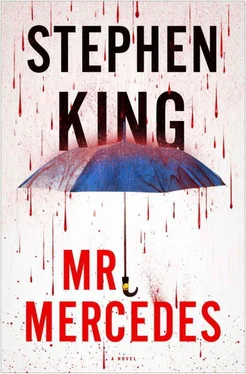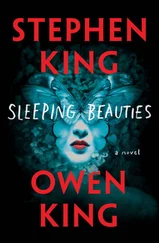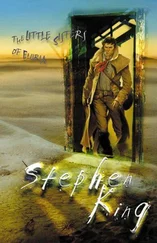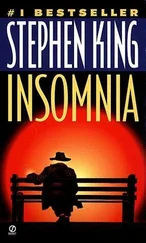“Mr. Beeson,” Hodges says, “I appreciate your concern, but you need to go back to your house and—”
“No, wait,” Holly says. She’s leaning across the center console of Olivia Trelawney’s Mercedes so she can look up at Beeson’s face. “Tell me how Mr. Hartsfield sounds. I need to know how his voice sounds.”
Beeson looks perplexed. “Like anyone, I guess. Why?”
“Is it low? You know, baritone?”
“You mean like one of those fat opera singers?” Beeson laughs. “Hell, no. What kind of question is that?”
“Not high and squeaky, either?”
To Hodges, Beeson says, “Is your partner crazy?”
Only a little, Hodges thinks. “Just answer the question, sir.”
“Not low, not high and squeaky. Regular! What’s going on?”
“No accent?” Holly persists. “Like… um… Southern? Or New England? Or Brooklyn, maybe?”
“No, I said. He sounds like anybody.”
Holly sits back, apparently satisfied.
Hodges says, “Go back inside, Mr. Beeson. Please.”
Beeson snorts but backs off. He pauses at the foot of his steps to cast a glare over his shoulder. It’s one Hodges has seen many times before, the I pay your salary, asshole glare. Then he goes inside, slamming the door behind him to make sure they get the point. Soon he appears once more at the window with his arms folded over his chest.
“What if he calls the cop shop to ask what we’re doing here?” Jerome asks from the back seat.
Hodges smiles. It’s wintry but genuine. “Good luck with that tonight. Come on.”
As he leads them single-file along the narrow path between the house and the garage, he checks his watch. Quarter past six. He thinks, How the time flies when you’re having fun.
They enter the kitchen. Hodges opens the basement door and reaches for the light switch.
“No,” Holly says. “Leave it off.”
He looks at her questioningly, but Holly has turned to Jerome.
“You have to do it. Mr. Hodges is too old and I’m a woman.”
For a moment Jerome doesn’t get it, then he does. “Control equals lights?”
She nods. Her face is tense and drawn. “It should work if your voice is anywhere close to his.”
Jerome steps into the doorway, clears his throat self-consciously, and says, “Control.”
The basement remains dark.
Hodges says, “You’ve got a naturally low voice. Not baritone, but low. It’s why you sound older than you really are when you’re on the phone. See if you can raise it up a little.”
Jerome repeats the word, and the lights in the basement come on. Holly Gibney, whose life has not exactly been a sitcom, laughs and claps her hands.
It’s six-twenty when Tanya Robinson arrives at the MAC, and as she joins the line of incoming vehicles, she wishes she’d listened to the girls’ importuning and left for the concert an hour earlier. The lot is already three-quarters full. Guys in orange vests are flagging traffic. One of them waves her to the left. She turns that way, driving with slow care because she’s borrowed Ginny Carver’s Tahoe for tonight’s safari, and the last thing she wants is to get into a fender-bender. In the seats behind her, the girls—Hilda Carver, Betsy DeWitt, Dinah Scott, and her own Barbara—are literally bouncing with excitement. They have loaded the Tahoe’s CD changer with their ’Round Here CDs (among them they have all six), and they squeal “Oh, I love this one!” every time a new tune comes on. It’s noisy and it’s stressful and Tanya is surprised to find she’s enjoying herself quite a lot.
“Watch out for the crippled guy, Mrs. Robinson,” Betsy says, pointing.
The crippled guy is skinny, pale, and bald, all but floating inside his baggy tee-shirt. He’s holding what looks like a framed picture in his lap, and she can also see one of those urine bags. A sadly jaunty ’Round Here pennant juts from a pocket on the side of his wheelchair. Poor man, Tanya thinks.
“Maybe we should help him,” Barbara says. “He’s going awful slow.”
“Bless your kind heart,” Tanya says. “Let me get us parked, and if he hasn’t made it to the building when we walk back, we’ll do just that.”
She slides the borrowed Tahoe into an empty space and turns it off with a sigh of relief.
“Boy, look at the lines ,” Dinah says. “There must be a zillion people here.”
“Nowhere near that many,” Tanya says, “but it is a lot. They’ll open the doors soon, though. And we’ve got good seats, so don’t worry about that.”
“You’ve still got the tickets, right, Mom?”
Tanya ostentatiously checks her purse. “Got them right here, hon.”
“And we can have souvenirs?”
“One each, and nothing that costs over ten dollars.”
“I’ve got my own money, Mrs. Robinson,” Betsy says as they climb out of the Tahoe. The girls are a little nervous at the sight of the crowd growing outside the MAC. They cluster together, their four shadows becoming a single dark puddle in the strong early-evening sunlight.
“I’m sure you do, Bets, but this is on me,” Tanya says. “Now listen up, girls. I want you to give me your money and phones for safekeeping. Sometimes there are pickpockets at these big public gatherings. I’ll give everything back when we’re safe in our seats, but no texting or calling once the show starts—are we clear on that?”
“Can we each take a picture first, Mrs. Robinson?” Hilda asks.
“Yes. One each.”
“Two!” Barbara begs.
“All right, two. But hurry up.”
They each take two pictures, promising to email them later, so everyone has a complete set. Tanya takes a couple of her own, with the four girls grouped together and their arms around each other’s shoulders. She thinks they look lovely.
“Okay, ladies, hand over the cash and the cackleboxes.”
The girls give up thirty dollars or so among them and their candy-colored phones. Tanya puts everything in her purse and locks Ginny Carver’s van with the button on the key-fob. She hears the satisfying thump of the locks engaging—a sound that means safety and security.
“Now listen, you crazy females. We’re all going to hold hands until we’re in our seats, okay? Let me hear your okay.”
“Okaay!” the girls shout, and grab hands. They’re tricked out in their best skinny jeans and their best sneakers. All are wearing ’Round Here tees, and Hilda’s ponytail has been tied with a white silk ribbon that says I LUV CAM in red letters.
“And we’re going to have fun, right? Best time ever, right? Let me hear your okay.”
“OKAAAYYYY!”
Satisfied, Tanya leads them toward the MAC. It’s a long walk across hot macadam, but none of them seems to mind. Tanya looks for the bald man in the wheelchair and spies him making his way toward the back of the handicapped line. That one is much shorter, but it still makes her sad to see all those broken folks. Then the wheelchairs start to move. They’re letting the handicapped people in first, and she thinks that’s a good idea. Let all or at least most of them get settled in their own section before the stampede begins.
As Tanya’s party reaches the end of the shortest line of abled people (which is still very long), she watches the skinny bald guy propel himself up the handicap ramp and thinks how much easier it would be for him if he had one of those motorized chairs. She wonders about the picture in his lap. Some loved relative who’s gone on? That seems the most likely.
Poor man, she thinks again, and sends up a brief prayer to God, thanking Him that her own two kids are all right.
“Mom?” Barbara says.
“Yes, honey?”
“Best time ever, right?”
Читать дальше












